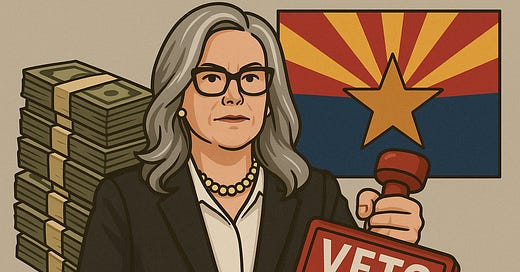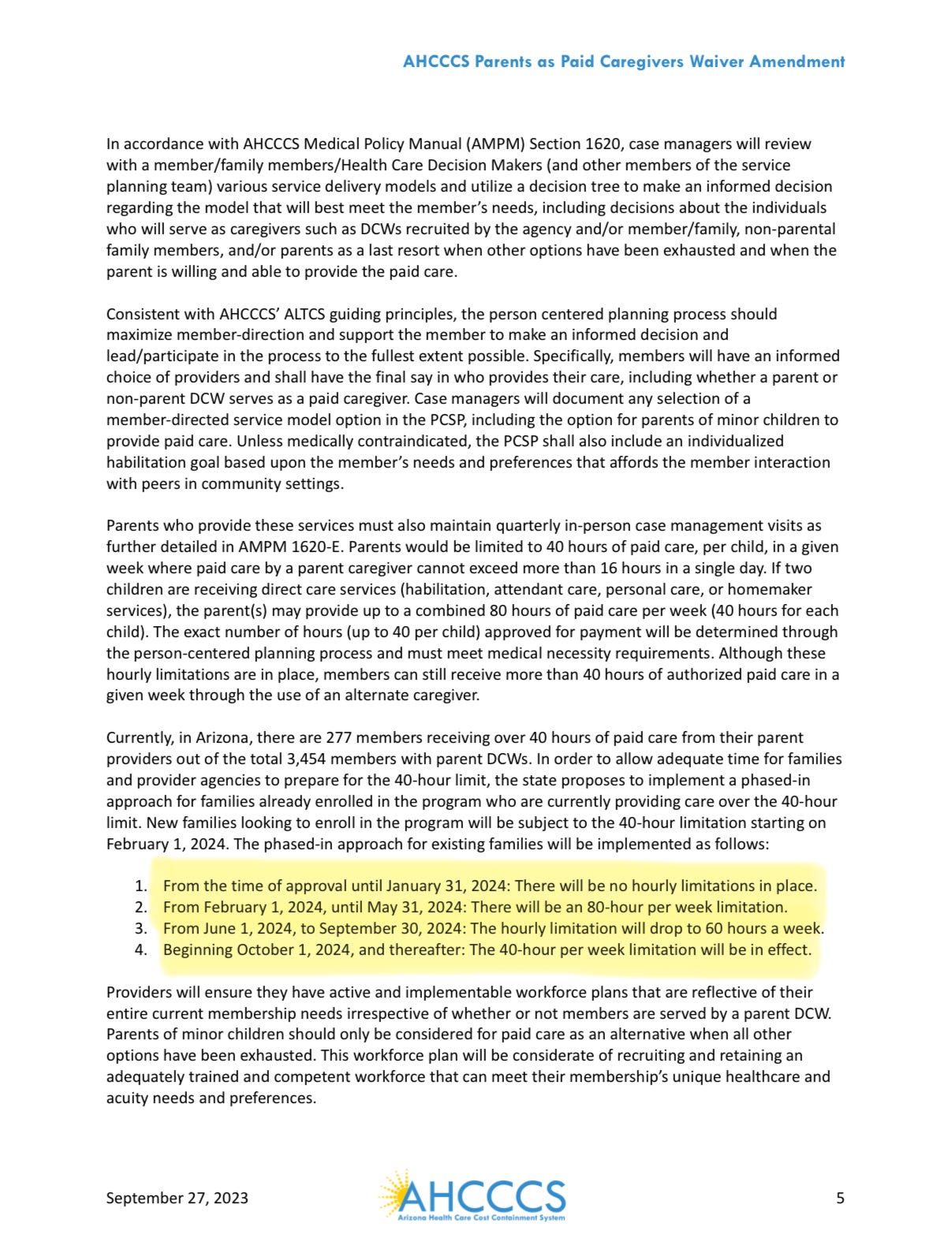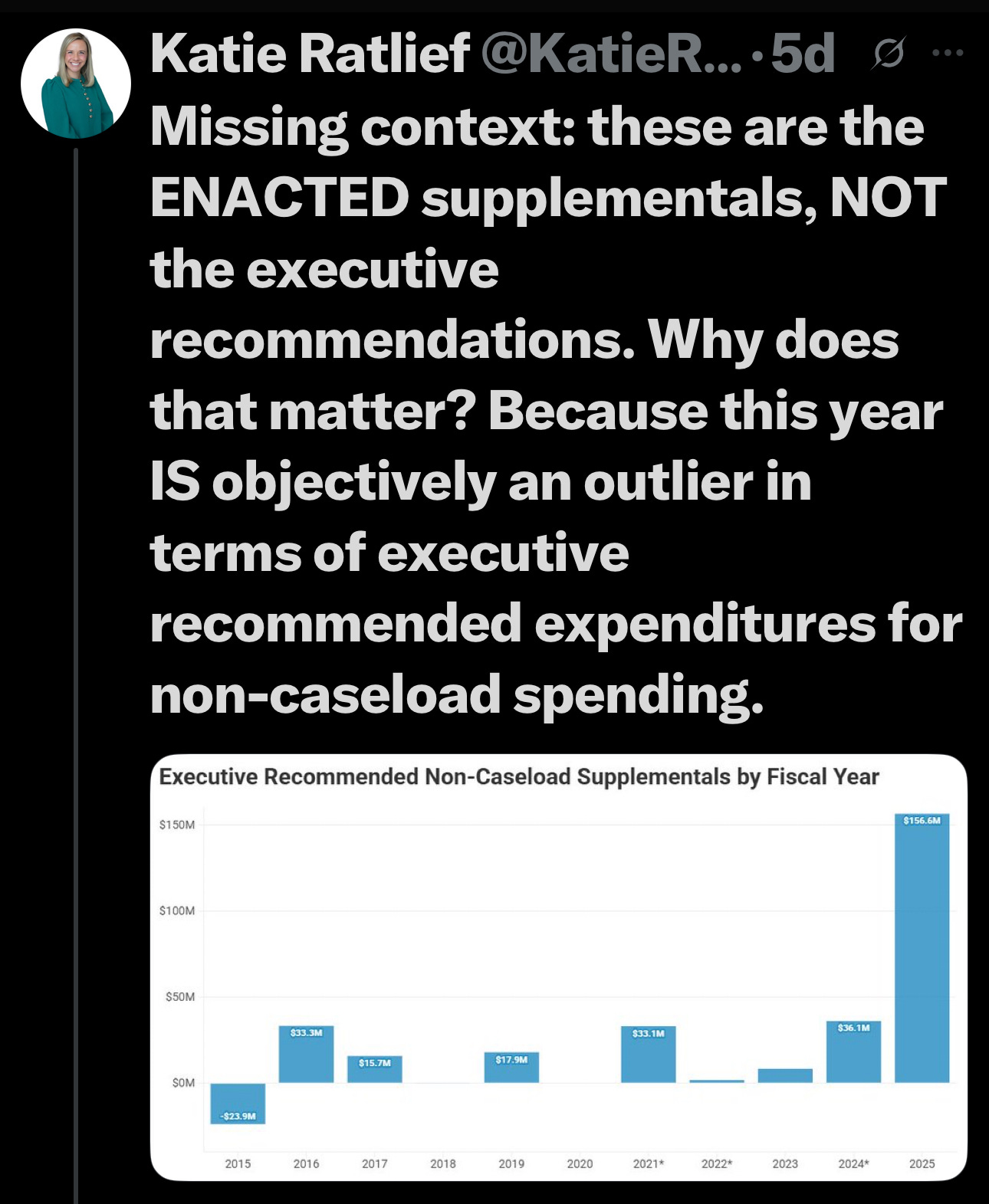Did Katie Hobbs Steal $350 Million Dollars?
No, It Wasn’t Theft—But Perhaps Epic Mismanagement: A Breakdown of Arizona’s Budget Mess
Arizona’s “Parents as Paid Caregivers” (PPCG) program, which compensates parents for providing in-home care to their children with disabilities, is at risk of running out of money due to funding shortfalls and political disagreements. How did Arizona elected officials get to the brink of government programs closing their doors? This situation is a combination of increased program costs, the expiration of federal funding, and poor budget management.
CONTEXT IS KEY:
The PPCG program was initiated in 2020 during the COVID-19 pandemic to address a shortage of professional caregivers. It allowed parents to be paid for providing care to their children with disabilities at home, funded entirely by the federal government.
But when the “Public Health Emergency” ended the Biden administration canceled the funding. Here is where Hobbs ran into problems, when the federal money ended, Hobbs continued to spend - and spend. Without seeking guidance from the legislature or informing them there was a problem.
2023 HOBBS ADMINISTRATION KNEW THERE WAS A PROBLEM
In September 2023, the Arizona Health Care Cost Containment System (AHCCCS) submitted a Section 1115 waiver amendment request to the Centers for Medicare & Medicaid Services (CMS). This amendment aimed to make permanent the temporary flexibility granted during the COVID-19 Public Health Emergency, which allowed parents of minor children with disabilities to be compensated for providing in-home care.
The Waiver Amendment: How It Sparked a $122M Crisis
It Defined “Extraordinary Care”: The amendment specifies that compensated care must exceed typical parental responsibilities and be necessary to ensure the health and welfare of the child, thereby preventing institutionalization.
Implemented Service Hour Limitations: To maintain budget neutrality, the amendment proposes a cap of 40 hours per week per child for paid caregiving services provided by parents.
Approval: CMS approved this waiver amendment on February 16, 2024, allowing Arizona to continue and formalize the Parents as Paid Caregivers program under the outlined conditions.
The problem: According to insiders, Hobbs kept spending under the Covid-era terms. The one the federal government was no longer paying for. Her administration agreed to the waiver but did not agree to the terms.
In a nutshell: Arizona’s “Parents as Paid Caregivers” program started during COVID to help families care for children with disabilities at home. It was fully funded by the federal government—until that funding expired in March 2024. At that point, Arizona was supposed to take on part of the cost and follow new federal rules, including capping the hours. But Governor Hobbs continued the program without following those terms, which caused a $122 million budget shortfall in the Division of Developmental Disabilities.
Republicans argue that the administration expanded the program without legislative approval and delayed implementing cost-control measures.
According to the Waiver Amendment Request dated September 27, 2023, the Hobbs administration agreed to gradually reduce the number of paid caregiving hours—but never put those guidelines into effect.
IS THE PARENTS AS PAID CAREGIVERS PROGRAM CONSTITUTIONALLY AUTHORIZED IN ARIZONA?
Arizona’s PPCG program, initiated during the COVID-19 pandemic, was not codified into state law. According to Article IX, Section 5 of the Arizona Constitution, “No money shall be paid out of the state treasury, except in the manner provided by law.” This provision implies that state funds must be expended only as authorized by law. Governor Hobbs continued funding the PPCG program beyond the expiration of federal support without legislative appropriation, leading to a $122 million shortfall in the DDD budget. Critics argue that this continuation without legislative approval may violate the constitutional requirement that all state expenditures be authorized by law.
As it stands, PPCG program has not been codified into state law—raising serious concerns about its legal footing. One legislator told State 48 News, “This is a gray area,” but confirmed that lawmakers intend to “close the loopholes in this program.” Without formal legislative backing, the program remains vulnerable to legal challenges. If it’s going to continue, it must be placed on firm constitutional and statutory ground.
BUT SERIOUSLY… WHERE DID THE $350 MILLION GO?
Arizona is facing increased scrutiny over a $350 million budget shortfall. While Governor Hobbs is accused of wrongdoing, critics point to widespread fiscal mismanagement as the issue. The state budget is based on estimates, not exact figures, and according to one insider, typical variances are around $20 million. This year’s gap, however, is far beyond normal—fueled by program expansions, unchecked spending, and a controversial rate increase granted to Sunshine Residential. The result: a deficit that’s raising serious concerns about oversight and accountability at the executive level.
Katie Ratlief, Director of Common Sense Institute Arizona, shared a chart of prior supplemental requests and stated, “This year IS objectively an outlier.” She added, “The executive failed to account for a massive amount of agency needs, and policy changes made without the legislature’s input, in last year’s budget and has had to ask for an unusual amount of money this year.”
Source: X - @katieratliefaz
If you’re ready to wade into the accounting weeds and really understand what went wrong with the budget, check out the full report from the Common Sense Institute here.
In a recent Committee on Executive Budget Mismanagement, Representative Matt Gress(R) highlighted that Governor Katie Hobbs’ decision not to implement the agreed-upon step-down cap in the Medicaid waiver resulted in missed opportunities for cost savings. Compounding the issue, the program has experienced over a 30% increase in utilization, and currently, there is no cap in place to manage this growth.
SOURCE: AZLEG.GOV
Republican lawmakers are advocating for measures to rein in the program and establish clear guardrails. However, Hobbs has declared a moratorium on signing any new legislation until a “bipartisan agreement” is reached to fund the program.
Arizona is in a standoff and the clock is ticking for the program to run out of money.
This is a developing story.








Defund Hobbs and press charges against her!
Katie Ratlief worked for RINO Doug Ducey and Common Sense Institute Arizona claims to be "non-partisan." Arizona is run by a huge DNC/RINO crime machine so there's not really a place to be "non-partisan."
Arizona is partisan, with the crime machine on one side and ordinary citizens on the other. If 350 million dollars are missing, the citizens will not assume it's a mistake, even if some "non-partisan" person says so.